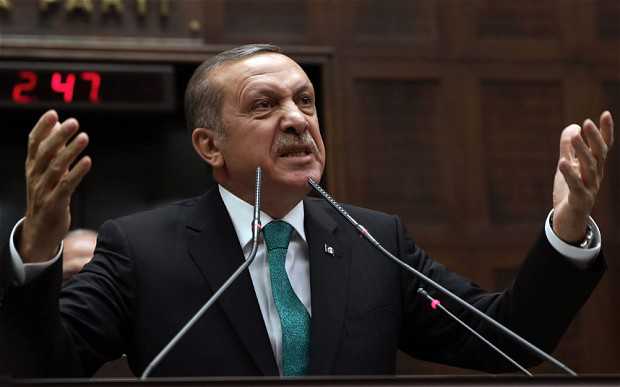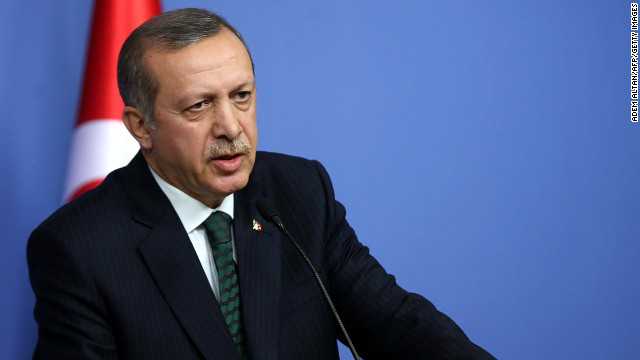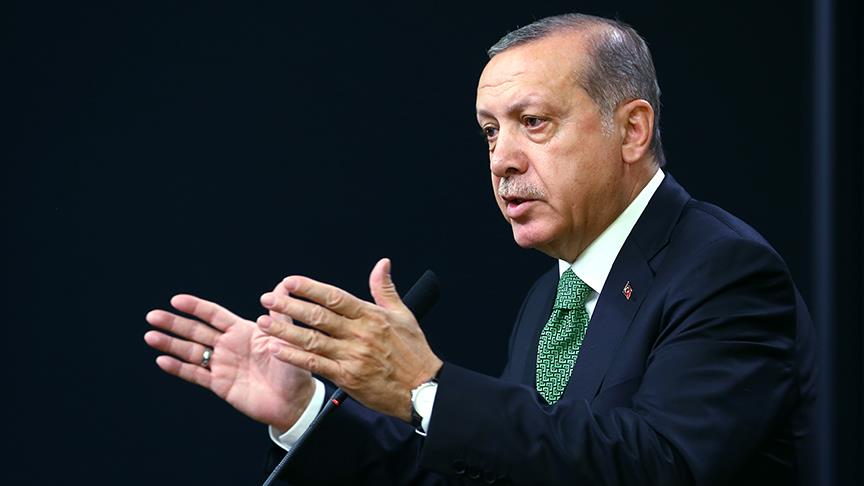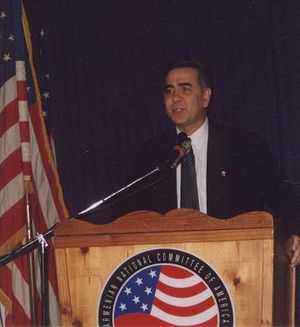|
|||||||||||||||||
Tag: Recep Tayyip Erdogan
12th president of Turkey
-

Turkey Reveals True Intentions in Protocols Game
-

Turkey to recompense $1.1 billion for low-priced Azeri gas
TURKISH-ARMENIAN PROTOCOLS ARE AT WORK
[ 28 Oct 2009 15:18 ]
Trend News AgencyBaku. Rashad Suleymanov – APA-ECONOMICS. Turkey will pay the difference between the old price it has paid for Azeri gas since April 2008 after the gas agreement expired and the new price to be agreed on with Azerbaijan, said Turkish Energy Minister Taner Yilldiz.
According to him, Turkey has continued to import natural gas from Azerbaijan although the gas supply agreement expired in April 2008.
“Today we no longer buy low-priced gas from Azerbaijan. In accordance with the new price to be agreed upon, we will pay the difference”, he said, adding that Turkey is continuing talks with Azerbaijan’s SOCAR on natural gas, and hopes to reach an agreement soon.
Turkish media report that Turkey will have to pay at least $1.1 billion to Azerbaijan as price difference compensation if the new gas price is around $250 per 1,000 cubic meters, compared to the current price of $120. .
-

Turkey’s Prime Minister Troubled by Armenia’s Diaspora
By Appo Jabarian
Executive Publisher / Managing Editor
USA Armenian Life MagazineDuring a recent interview with the Wall Street Journal, Turkey’s Prime Minister Recep Tayyip Erdogan went on a temper tantrum against Diaspora Armenians.When asked about the Protocols, Armenia, and Artsakh (Nagorno Karabagh), Mr. Erdogan said: “I believe when President Sargsyan was on an international visit, he was faced by a reaction from the Armenian Diaspora. So what he does in face of the reaction of the Diaspora is very important. If he can stand firm, and if it is the government of Armenia and not the Armenian Diaspora that is determining policy in Armenia, then I think that we can move forward. As far as we’re concerned there is no problem. But it is up to the government in Armenia.
Next, he added: “What is important and I would like to underline this, because this is perhaps the most important point is that Armenia should not allow its policies to be taken hostage by the Armenian Diaspora. It should be up to the government to carry out its policies.”
It’s all too clear that Mr. Erdogan wants to divide and conquer. The Turkish Prime Minister is working overtime to create a wedge between Armenia and its 8-million strong Diaspora.
Will the denialist Turkish leader succeed in stripping Armenia from its number one social, economic, and political ally, the Armenian Diaspora?
It was because of a strong opposition by Armenians both in the homeland and the Diaspora to the unfair terms of the Protocols, including Ankara’s demand that Armenia give up its pursuit of Artsakh’s independence, Turkey back-paddled and started to distance itself from the Artsakh issue, separating it from the normalization of diplomatic ties with Armenia.
But that should not misguide the Armenians into thinking that Turkey is doing Armenia and Armenians a favor. They are entitled to carry out the Destalinization/Deturkification process of the Armenian territories. Artsakh is the first of many steps leading to the ultimate reunification of Armenia through the establishment of Federal Republics of Armenia.
In 1921, the following Eastern Armenian provinces of Artsakh (1), Nakhitchevan (1), Gandzak (1), Javakhq (2), Ardahan (3), Kars (3), and Igdir (3) were stalinized under the infamous Soviet dictator Josef Stalin. They were carved out of Armenia of 1918 and were arbitrarily “gifted” respectively to the newly Sovietized Azerbaijan (1), Georgia (2), and Kemalist Turkey (3).
Now that the infamous Protocols are signed, Armenians in Armenia and around the world have no choice but to derail its ratification in the National Assembly. Armenia’s capitulation to unfair Turkish demands shall not be allowed to linger. Turkey should be stopped and Armenia should be saved. Otherwise, Mr. Erdogan’s obvious anxiety over the Diaspora Armenians activism will definitely multiply.
He should take no solace from the temporary support of Secretary of State Hillary Clinton, acting as a proxy for the multi-national oil/gas conglomerates.
Secretary Clinton: The Oil Lady
During ’08 U.S. presidential primary election season, then candidate Hillary Clinton used to refer to then President George W. Bush and Vice-President Dick Cheney as “The oilmen.”
So now, since she is eagerly catering to energy multi-national corporations’ thirst for faster profits at the expense of Armenia and Armenians, she must be called “The Oil Lady.”
On October 14, The Washington Post reported that Secretary Clinton “executed some deft diplomacy last weekend as the leaders of Turkey and Armenia signed a potentially historic deal to establish normal diplomatic relations and reopen their borders. We say ‘potentially’ because there are some big obstacles to implementing the accord, which we’ll come back to. … The rapprochement between these two nations matters to the United States for a number of reasons. It could help stabilize the volatile Caucasus region, open the way for new corridors for the export of gas and oil to the West, ease Russia’s political domination of Armenia, and remove a major irritant from U.S. relations with Turkey. The Obama administration worked diligently to promote the accord. … President Obama played a part by sidestepping a campaign promise to formally recognize the mass killing of Armenians by Turks during World War I as ‘genocide.’”
The Moscow, Europe and U.S.-based energy giants have set their eyes on the construction of their oil pipeline linking the oil and gas fields of Central Asia to Europe via Azerbaijan, Armenia, and Turkey. But why pursue it at dire consequences for Armenia and Diaspora Armenians? Why allow Turkey to exploit the opportunity by forcing Armenia to give up its demands of lands in Turkish-occupied Western Armenia; Reparations for the Turkish-executed Armenian genocide?
By abusing the political opportunity, Turkey has poured more gasoline on the fire, igniting worldwide Armenian condemnation. But who is to blame for the fact that Turkey is deeply troubled by Armenia’s Diaspora? Turkey!
-

Armenians horrified by treaty with Turkey
Genocide forgotten:
A new trade deal is set to gloss over the
murder of 1.5 million peopleBy Robert Fisk
www.independent.co.ukIn the autumn of 1915, an Austrian engineer called Litzmayer, who was helping build the Constantinople-Baghdad railway, saw what he thought was a large Turkish army heading for Mesopotamia. But as the crowd came closer, he realised it was a huge caravan of women, moving forward under the supervision of soldiers.
The 40,000 or so women were all Armenians, separated from their men – most of whom had already had their throats cut by Turkish gendarmerie – and deported on a genocidal death march during which up to 1.5 million Armenians died.
Subjected to constant rape and beatings, some had already swallowed poison on their way from their homes in Erzerum, Serena, Sivas, Bitlis and other cities in Turkish western Armenia. “Some of them,” Bishop Grigoris Balakian, one of Litzmayer’s contemporaries, recorded, “had been driven to such a state that they were mere skeletons enveloped in rags, with skin that had turned leathery, burned from the sun, cold, and wind. Many pregnant women, having become numb, had left their newborns on the side of the road as a protest against mankind and God.” Every year, new evidence emerges about this mass ethnic cleansing, the first holocaust of the last century; and every year, Turkey denies that it ever committed genocide. Yet on Saturday – to the horror of millions of descendants of Armenian survivors – the President of Armenia, Serg Sarkissian, plans to agree to a protocol with Turkey to re-open diplomatic relations, which should allow for new trade concessions and oil interests. And he proposes to do this without honouring his most important promise to Armenians abroad – to demand that Turkey admit it carried out the Armenian genocide in 1915.
In Beirut yesterday, outside Mr Sarkissian’s hotel, thousands of Armenians protested against this trade-for-denial treaty. “We will not forget,” their banners read. “Armenian history is not for sale.” They called the President a traitor. “Why should our million and a half martyrs be put up for sale?” one of them asked. “And what about our Armenian lands in Turkey, the homes our grandparents left behind? Sarkissian is selling them too.”
The sad truth is that the 5.7 million Armenian diaspora, scattered across Russia, the US, France, Lebanon and many other countries, are the descendants of the western Armenians who bore the brunt of Turkish Ottoman brutality in 1915.
Tiny, landlocked, modern-day Armenia – its population a mere 3.2 million, living in what was once called eastern Armenia – is poor, flaunts a dubious version of democracy and is deeply corrupt. It relies on remittances from its wealthier cousins overseas; hence Mr Sarkissian’s hopeless mission to New York, Los Angeles, Paris, Beirut and Rostov-on-Don to persuade them to support the treaty, to be signed by the Armenian and Turkish Foreign Ministers in Switzerland.
The Turks have also been trumpeting a possible settlement to the territory of Nagorno-Karabagh, part of historic Armenia seized from Azerbaijan by Armenian militias almost two decades ago – not without a little ethnic cleansing by Armenians, it should be added. But it is the refusal of the Yerevan government to make Turkey’s acknowledgement of the genocide a condition of talks that has infuriated the diaspora.
“The Armenian government is trying to sweeten the taste for us by suggesting that Turkish and Armenian historians sit down to decide what happened in 1915,” one of the Armenians protesting in Beirut said.
“But would the Israelis maintain diplomatic relations if the German government suddenly called the Jewish Holocaust into question and suggested it all be mulled over by historians?”
Betrayal has always been in the air. Barack Obama was the third successive US President to promise Armenian electors that he would acknowledge the genocide if he won office – and then to betray them, once elected, by refusing even to use the word. Despite thunderous denunciations in the aftermath of the Armenian genocide by Lloyd George and Churchill – the first British politician to call it a holocaust – the Foreign Office also now meekly claims that the “details” of the 1915 massacres are still in question. Yet still the evidence comes in, even from this newspaper’s readers. In a letter to me, an Australian, Robert Davidson, said his grandfather, John “Jock” Davidson, a First World War veteran of the Australian Light Horse, had witnessed the Armenian genocide: “He wrote of the hundreds of Armenian carcasses outside the walls of Homs. They were men, women and children and were all naked and had been left to rot or be devoured by dogs.
“The Australian Light Horsemen were appalled at the brutality done to these people. In another instance his company came upon an Armenian woman and two children in skeletal condition. She signed to them that the Turks had cut the throats of her husband and two elder children.”
In his new book on Bishop Balakian, Armenian Golgotha, the historian Peter Balakian (the bishop’s great-nephew) records how British soldiers who had surrendered to the Turks at Kut al-Amara in present-day Iraq and were sent on their own death march north – of 13,000 British and Indian soldiers, only 1,600 would survive – had spoken of frightful scenes of Armenian carnage near Deir ez-Zour, not far from Homs in Syria. “In those vast deserts,” the Bishop said, “they had come upon piles of human bones, crushed skulls, and skeletons stretched out everywhere, and heaps of skeletons of murdered children.”
When the foreign ministers sit down to sign their protocol in Switzerland on Saturday, they must hope that blood does not run out of their pens. -

‘Iran is our friend,’ says Turkish PM Recep Tayyip Erdogan
• We have no difficulty with Ahmadinejad – Erdogan
• Warning to Europe not to ignore Turkey’s strengths With its stunning vistas and former Ottoman palaces, the banks of the Bosphorus – the strategic waterway that cuts Istanbul in half and divides Europe from Asia – may be the perfect place to distinguish friend from foe and establish where your country’s interests lie.
With its stunning vistas and former Ottoman palaces, the banks of the Bosphorus – the strategic waterway that cuts Istanbul in half and divides Europe from Asia – may be the perfect place to distinguish friend from foe and establish where your country’s interests lie.And sitting in his grandiose headquarters beside the strait, long the symbol of Turkey‘s supposed role as bridge between east and west, Recep Tayyip Erdogan had little doubt about who was a friend and who wasn’t.
Mahmoud Ahmadinejad, Iran‘s radical president whose fiery rhetoric has made him a bête noire of the west? “There is no doubt he is our friend,” said Erdogan, Turkey’s prime minister for the last six years. “As a friend so far we have very good relations and have had no difficulty at all.”
What about Nicolas Sarkozy, president of France, who has led European opposition to Turkey’s bid to join the EU and, coincidentally, adopted a belligerent tone towards Iran’s nuclear programme? Not a friend?
“Among leaders in Europe there are those who have prejudices against Turkey, like France and Germany. Previously under Mr Chirac, we had excellent relations [with France] and he was very positive towards Turkey. But during the time of Mr Sarkozy, this is not the case. It is an unfair attitude. The European Union is violating its own rules.
“Being in the European Union we would be building bridges between the 1.5bn people of Muslim world to the non-Muslim world. They have to see this. If they ignore it, it brings weakness to the EU.”
Friendly towards a religious theocratic Iran, covetous and increasingly resentful of a secular but maddeningly dismissive Europe: it seems the perfect summary of Turkey’s east-west dichotomy.
Erdogan’s partiality towards Ahmadinejad may surprise some in the west who see Turkey as a western-oriented democracy firmly grounded inside Nato. It has been a member of the alliance since 1952. It will be less surprising to Erdogan’s secular domestic critics, who believe the prime minister’s heart lies in the east and have long suspected his Islamist-rooted Justice and Development party (AKP) government of plotting to transform Turkey into a religious state resembling Iran.
Erdogan vigorously denies the latter charge, but to his critics he and Ahmadinejad are birds of a feather: devout religious conservatives from humble backgrounds who court popular support by talking the language of the street. After Ahmadinejad’s disputed presidential election in June, Erdogan and his ally, the Turkish president, Abdullah Gul, were among the first foreign leaders to make congratulatory phone calls, ignoring the mass demonstrations and concerns of western leaders over the result’s legitimacy.
Talking to the Guardian, Erdogan called the move a “necessity of bilateral relations”. “Mr Ahmadinejad was declared to be the winner, not officially, but with a large vote difference, and since he is someone we have met before, we called to congratulate him,” he said.
“Later it was officially declared that he was elected, he got a vote of confidence and we pay special attention to something like this. It is a basic principle of our foreign policy.”
The gesture will be remembered when Erdogan arrives in Tehran this week for talks with Ahmadinejad and Ayatollah Ali Khamenei, Iran’s supreme leader, that will focus on commercial ties, including Turkey’s need for Iranian natural gas. Ahmadinejad has voiced his admiration for Erdogan, praising Turkey’s recent decision to ban Israel from a planned Nato manoeuvre in protest at last winter’s bombardment of Gaza.
Since the election, Iran has witnessed a fierce crackdown on opposition figures that has resulted in activists, students and journalists being imprisoned and publicly tried. Detainees have died in prison, and there have been allegations of torture and rape. Some of those alleging mistreatment have sought refuge in Turkey.
But Erdogan said he would not raise the post-election crackdown with his hosts, saying it would represent “interference” in Iranian domestic affairs.
He poured cold water on western accusations that Iran is seeking a nuclear weapon, saying: “Iran does not accept it is building a weapon. They are working on nuclear power for the purposes of energy only.”
Erdogan has overseen a dramatic improvement in the previously frigid relations between Turkey and Iran, which was viewed with suspicion by the pro-secularist high command of the powerful Turkish military. Trade between the two countries last year was worth an estimated £5.5bn as Iran has developed into a major market for Turkish exports.
Erdogan’s views will interest US foreign policy makers, who have long seen his AKP government as a model of a pro-western “moderate Islam” that could be adopted in other Muslim countries. They will also find an audience with President Barack Obama, who signalled Turkey’s strategic importance in a visit last April and has invited the prime minister to visit Washington. They are unlikely to impress Israel, which has warned that Erdogan’s criticisms risk harming Turkey’s relations with the US.
Erdogan dismissed the notion, saying: “I don’t think there is any possibility of that. America’s policy in this region is not dictated by Israel.”
He insisted that the Turkey-Israel strategic alliance – which some AKP insiders have said privately is over – remains alive but chided the Israeli foreign minister, Avigdor Lieberman, who he said had threatened to use nuclear weapons against Gaza.
The Guardian


